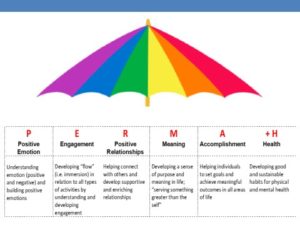Improving Implementation of Positive Psychology
‘Everything can be taken from man…but the last of human freedoms- to choose one’s attitudes in any set of given circumstances’. Viktor Frankl
My last Vortex article was a personal reflection on the lifestyle choice teachers make when deciding to make educating children their career and it was an acknowledgment of the need for teachers to be and feel valued by our community. Furthermore, it made a commitment to ensuring that despite increasing admin demands and changing climates, both student and teacher wellbeing would continue to be a focus and priority at SEC.
During the staff professional learning week, Mr Ian Garrity and I launched a school wide Positive Psychology framework; PERMA+H. This initiative, developed some 10 years ago by psychologist Martin Seligman is designed to focus on developing a person’s sense of ‘flourishing and wellbeing’ and making cognitive thinking choices that in turn change perceptions and behaviours. In short, we explored ways that we can more systematically and explicitly teach skills in achieving learned optimism, ‘happiness’ and meaning and purpose in life.
( https://www.brainpickings.org/2012/06/28/learned-optimism-martin-seligman/)
As a staff, we made a commitment to engage more in professional learning that would help us continue to improve our understanding of wellbeing, and build our own capacity with regard to ‘flourishing’. Research tells us that students benefit most when learning resilience and coping strategies when their teachers and parents have ‘good wellbeing’. We unpacked two theories in particular for achieving ‘the good life’ and looked at continuing to look for ways to incorporate both hedonic and eudemonic theory in our explicit teaching regime to help overall wellbeing and school culture. (https://www.authentichappiness.sas.upenn.edu/newsletters/flourishnewsletters/newtheory)
Traditional psychology is often focused on theories that look for what is wrong with a person and t hen looks for ways to try and fix a problem after it has arisen. In contrast, Positive Psychology concerns itself with being more proactive and looking for what is right with a person and using this as a foundation to build up an individual’s capacity. The PERMA+H initiative is specifically designed to be implemented within a school context with young people and targets building skills in the following domains: positive emotions, engagement, relationships, meaning and purpose, attainment and health. While the Pastoral Program at SEC has always been founded on theories that built capacity in our students to improve their sense of self and wellbeing, we are moving towards the more explicit teaching of the above-mentioned domains. Research tells us that ‘ building the skills of having better relationships, more meaning in life, more engagement, and more positive emotion is almost entirely different from building the skills of fighting depression, anxiety, and anger. So, positive psychology aims to develop interventions that build the enabling conditions of life, not just interventions that decrease misery’. (Seligman, 2010)
For further information about PERMA and a greater understanding on each of the domains, please click the following link. https://positivepsychology.com/perma-model/
For further information on Flourishing, please click on the following link. https://www.annualreviews.org/doi/abs/10.1146/annurev.psych.52.1.141

Leanne Gair (a/g Assistant Principal – Student Wellbeing)

